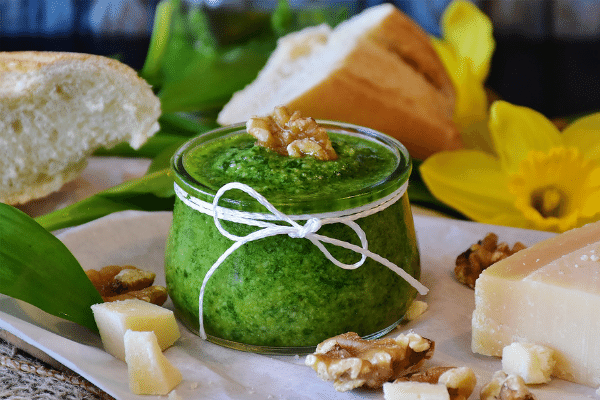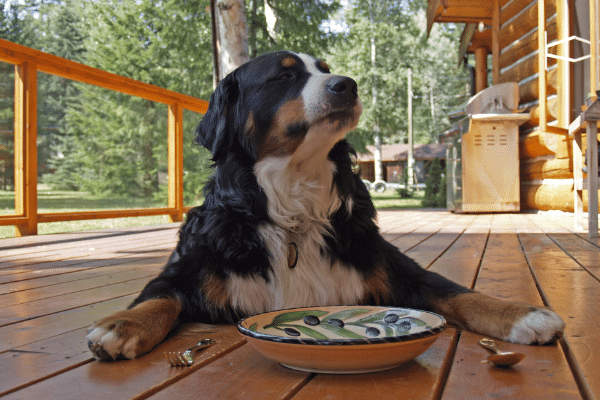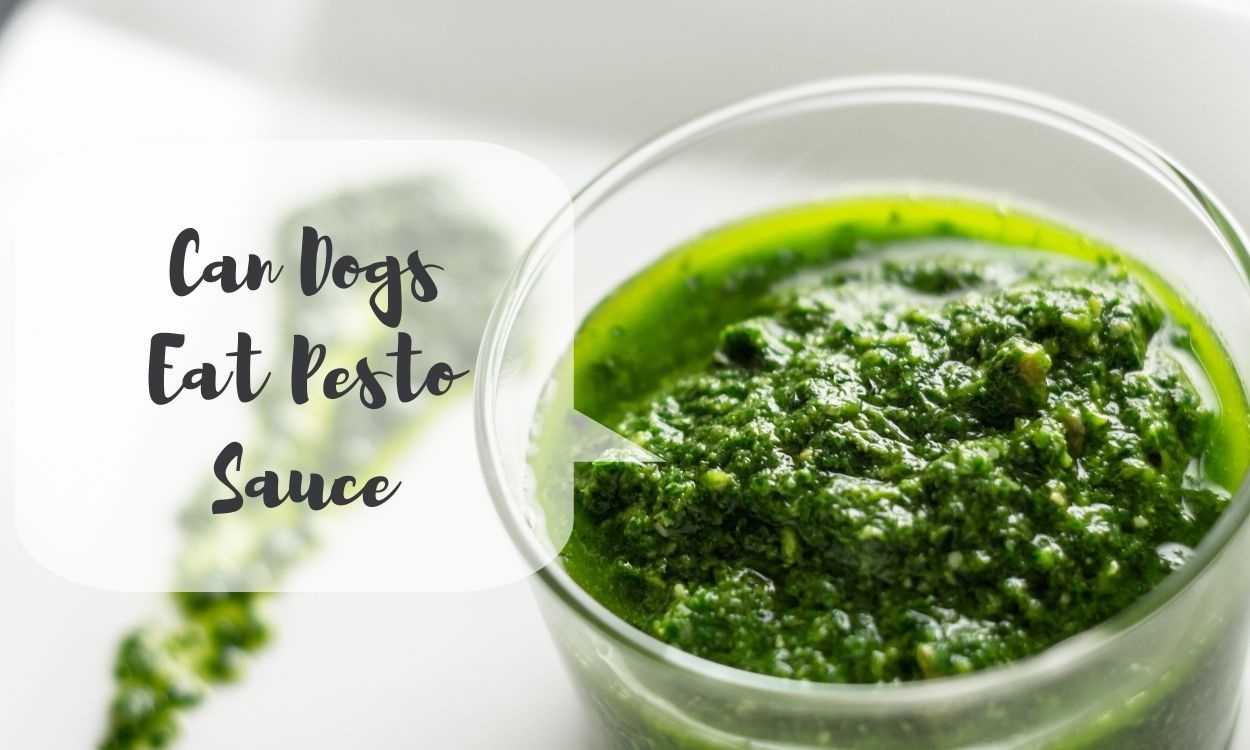You might know that the Pesto sauce originated in Italy. Similarly, ancient Romans made a similar recipe by the name of ‘moretum’?
Your favorite Pesto sauce is one of the favorite dips of people worldwide. But have you thought of giving your cute little doggo a few tablespoons of pesto sauce?
Are you concerned about whether or not dogs should eat pesto sauce? Are you looking for the risks and benefits of giving pesto sauce to your dog? Then, it would be best if you jumped right into this article.
Is Pesto Sauce Safe For Dogs?

Not always. Whether or not pesto sauce is safe for your dog depends on the kinds of ingredients used in it. Common ingredients of pesto sauce are as follows:
- Basil leaves
- Cheese (usually Parmigiano-Reggiano or Pecorino Sardo)
- Garlic
- Pine nuts
- Olive oil
- Coarse salt
- Other herbs like parsley and rosemary
Author’s Note: If you use only basil and some cheese, the pesto sauce is perfectly fine for your dog. However, using other ingredients like pine nuts and garlic can be hazardous for your dog.
What Are The Benefits Of Pesto In Dogs?

As mentioned in the previous section, if you do not put ingredients considered dangerous for dogs, pesto sauce can actually be beneficial for your pooch. Following are some health benefits of pesto sauce observed in dogs:
Basil leaves are anti-inflammatory and safe for dogs if served in moderate quantities. They contain loads of antioxidants that assist your dogs in preventing various diseases, including cancer.
Basil leaves also soothe the pain caused by arthritis in your dog. Moreover, they calm anxious dogs and aid in preventing cellular and nerve damage.
If you add parsley, it will make the sauce rich in Iron and folate along with vitamins A, C, and K. This also contains different volatile oils such as myristin. It inhibits the formation of tumors in dogs, particularly their lungs.
Rosemary in it is high in vitamins, fiber, and antioxidants. It prevents diseases in dogs and enhances their overall metabolism. Moreover, rosemary is anti-fungal and anti-inflammatory in nature.
Other common herbs used in pesto sauce are also very beneficial for dogs. Herbs like dill, cilantro, and peppermint are good for a dog’s digestive health.
What Are The Harmful Effects Of Pesto In Dogs?

Do not get swayed by the benefits of pesto sauce in dogs, its harmful effects in dogs outweigh the advantages:
Garlic
Garlic is a member of the allium family that includes chives, onions, and leeks. Like all its fellow members, garlic contains thiosulfate, which is toxic to your four-legged friend.
Thiosulfate is a salt of thiosulphuric acid and leads to oxidative damage of your dog’s red blood cells (RBCs). This causes hemolytic anemia in your furry pal, consequently reducing his RBCs in large numbers.
The following symptoms will be visible in your dog after consuming a lot of pesto filled with garlic:
- Red Urine
- Pale mucus membranes
- Pale gums
- Jaundice
- General body weakness
- Inability to balance
- Rapid breathing
- Fainting
- Lack of appetite
- Lethargy
Besides anemia, garlic poisoning is a guaranteed path of pain for your dog. If your dog eats up large amounts of pesto sauce containing garlic, the following signs will be apparent:
- Abdominal pain
- Diarrhea
- Vomiting
- Loss of appetite
- Dehydration
- Seizures
- Fever
- Weakness
- Depression
Pine Nuts
Other than garlic, you should be wary of pine nuts which are not recommended for dogs. Though not poisonous to dogs, pine nuts are rich in fats and lead to gastrointestinal issues in them.
Along with urinary tract infections and pancreatitis, excessive consumption of pine nuts leads to the following health issues in your pup:
- Rapid breathing
- Diarrhea
- Seizures
- General body weakness
- High fever
Olive Oil and Cheese
Like pine nuts, olive oil and cheese are not that harmful to dogs per se. However, their consumption in abnormal amounts can lead to health issues like obesity, diarrhea, and vomiting.
Moreover, you should check beforehand whether your dog is lactose intolerant or not. If he is, then do not feed him cheese at any cost.
Warning: Although not used in high amounts in pesto sauce, black pepper and nutmeg are also considered harmful for dogs.
How To Prepare a Dog-Friendly Pesto?
Do not get afraid of the adverse reactions mentioned in the previous section. If you carefully prepare a pesto sauce with dog-friendly ingredients, then your dog will surely thank you.
We suggest the following set of ingredients for preparing a homemade dog-friendly pesto sauce:
- One cup of freshly picked herbs like basil, rosemary, and parsley
- Few drops of oil as per your choice
- A handful of nuts such as brazil nuts and almonds
- One-third cup of grated parmesan cheese (or any other suitable cheese)
FAQs
- Can dogs eat basil pesto?
Yes, absolutely. Dogs can safely eat a pesto sauce containing basil along with some cheese and little drops of olive oil. It is very healthy and full of antioxidants.
- What are the alternatives to pesto for dogs?
If you do not want to feed pesto sauce to your dog at all, you don’t have to worry. You can pick healthy alternatives like applesauce, cottage cheese, plain non-fat yogurt, and pure peanut butter.
Conclusion
Pesto sauce has always been a controversial food dish. At one point of time, the French claimed that pesto was their creation. However, it was resolved when a prominent French chef Jean Baptiste Reboul accepted that pesto was invented in Genoa, Italy.
Another controversy regarding pesto sauce is whether or not dogs can safely eat it. And the correct answer is no if you are adding garlic, pine nuts, and salt to it. Go for the homemade recipe of pesto sauce mentioned above if your dog just cannot resist it.
As a responsible dog owner, you must have clarity of thought regarding your dog’s health and longevity. Products containing excess sodium, onions, garlic, and harmful preservatives are never recommended for dogs.
In this article, we have explained the ingredients, benefits, and risks of pesto sauce in dogs. We suggest rushing to the vet if your pooch behaves abnormally after consuming a lot of pesto sauce containing garlic and pine nuts.
This article will be updated with the latest medical research and other findings from time to time. Feel free to connect with us in the comments section below.

Dr. Aram Baker has been with Santa Clarita Animal Hospital since 1995 and his special interests include behaviour medicine and dermatology. He graduated from the Cleveland Humanities Magnet Program in Reseda, CA and attended California State University at Northridge where he received a Bachelor’s degree in biology. He went on to pursue his Doctorate in Veterinary Medicine at the University of California at Davis. He also spent time in the zoological medicine department at U.C. Davis during his Junior and Senior years. He is dedicated to caring for all pets big or small, young or old with compassion, patience, kindness, and love.
